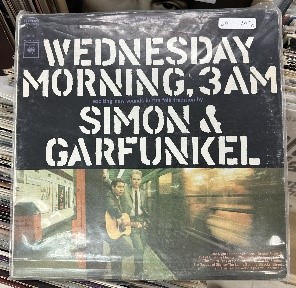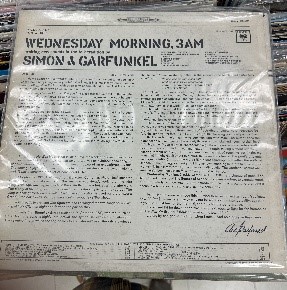Recently my wife and I were in an antique mall, and I came across a booth filled with vinyl records. As I was thumbing through them, I found a copy of Simon & Garfunkel’s first album from 1964, “Wednesday Morning, 3am”. The record describes itself as “exciting new sounds in the folk tradition”.


On the back are the album notes, provided by Art Garfunkel. They are in the form of a letter Art wrote to Paul Simon while Paul was in London and Art was back in the United States. As the final details are coming together for the record’s release the producer, Tom Wilson asks Art to write the album notes. Art and Paul have had some debate over the purpose, content, and influence of such notes. Paul doesn’t want to have an explanation of each song’s meaning or context. He believes it happens organically within the heart or mind of the individual listener. Art respects that but feels some measure of a “listener’s guide” could be beneficial. He explains to Paul, “I know how you feel about this, but I (your greatest advocate) want as many as possible to understand as much as possible.”
In the notes for what would be the album’s biggest hit, “The Sounds of Silence”, Garfunkel reveals that silence is the result of failed communication: “Its theme is man’s inability to communicate with man. The author sees the extent of communication as it is on only its most superficial and commercial level. There is no serious understanding because there is no serious communication. No one dares to take the risk of reaching out to disturb the sound of silence. The ending is an enigma. I find my own meaning in it but like most good works it is best interpreted by each person individually. The words tell us that when meaningful communication fails, the only sound is silence.”
Our world is filled with superficial and commercial communication. Words or messages can be purposefully shallow and manipulative, designed to activate our most immature reactions or to appease our desires at the expense of our needs. Yet when someone dares to point this out, they are often shamed and shunned into silence. If we are found in that silence, how will we respond?
Silence can be an opportunity for us to work on ourselves. We can either learn to listen better so we can respond better, or we can learn to take only what is relevant from a challenging moment of unsettling engagement and discard the rest. We shouldn’t be afraid of silence but empowered by using it to reflect and restore our understanding of how the world should be in accordance with God’s desire for Kin-dom within the Kingdom.
May such moments of silence provide an opportunity for us to be better equipped when we do break the sounds of silence, and offer an appropriate challenge or blessing, instead of simply adding to the noise.
Serving you, serving with you,

Rev. Dr. David Weatherly





Leave A Comment